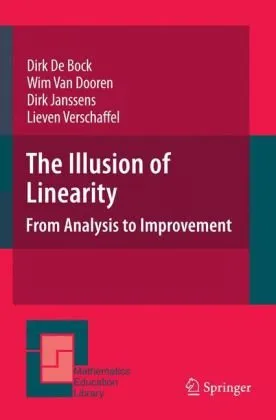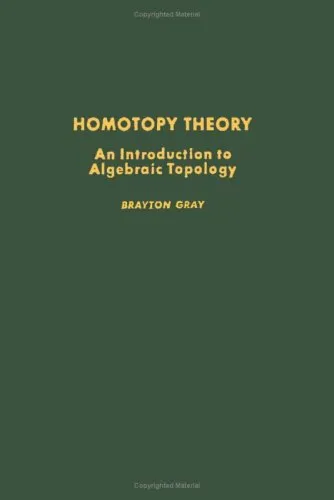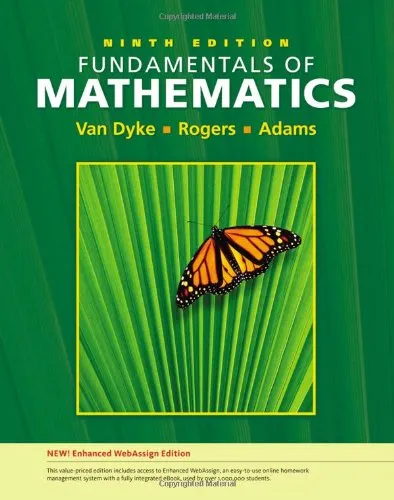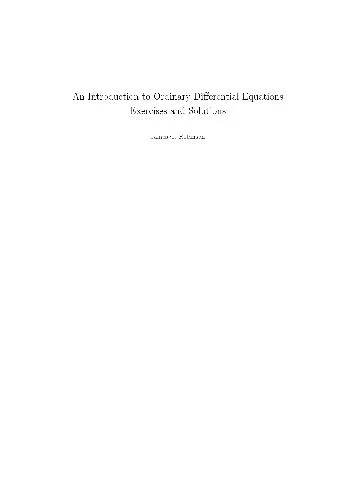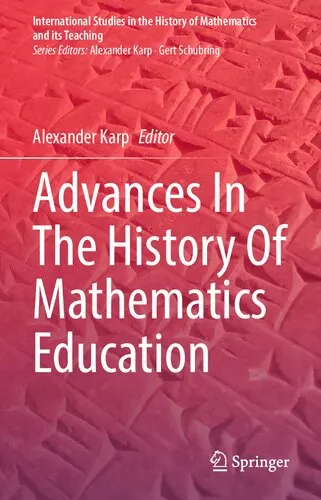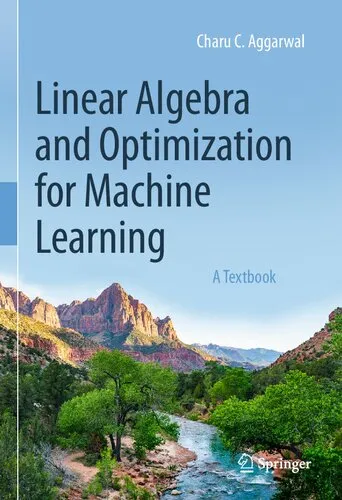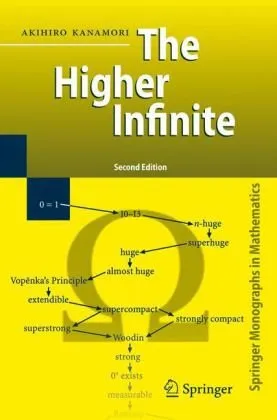Mathematics Anxiety What Is Known, and What is Still Missing
4.5
بر اساس نظر کاربران

شما میتونید سوالاتتون در باره کتاب رو از هوش مصنوعیش بعد از ورود بپرسید
هر دانلود یا پرسش از هوش مصنوعی 2 امتیاز لازم دارد، برای بدست آوردن امتیاز رایگان، به صفحه ی راهنمای امتیازات سر بزنید و یک سری کار ارزشمند انجام بدینکتاب های مرتبط:
مقدمهای بر کتاب "Mathematics Anxiety: What Is Known, and What is Still Missing"
کتاب Mathematics Anxiety: What Is Known, and What is Still Missing یک منبع ارزشمند و جامع درباره یکی از مهمترین موضوعات روانشناسی آموزشی، یعنی اضطراب ریاضی (Mathematics Anxiety)، است. این موضوع نه تنها در میان محققان، بلکه در حوزه آموزش و یادگیری ریاضی نیز بسیار چالشبرانگیز است. در این اثر، تلاش شده تا دانش کنونی درباره اضطراب ریاضی بررسی شده و ابعاد ناشناخته آن مورد تحلیل قرار گیرد. نویسندگان این کتاب، یعنی "ایرن سی. مامارلا"، "سارا کاویولا"، و "آن داوکر"، با تخصص خود در روانشناسی شناختی و ریاضیات، چشماندازی چندوجهی به این مسأله ارائه میدهند.
خلاصهای جامع از کتاب
این کتاب در چندین فصل منظم و ساختارمند به بررسی پیشینه پژوهشی، عوامل روانشناختی و شناختی مؤثر در اضطراب ریاضی میپردازد. در بخشهای اولیه کتاب، تعریف و مبانی اضطراب ریاضی معرفی شده و تأثیرات آن بر عملکرد تحصیلی و زندگی روزمره توضیح داده میشود. سپس، عوامل فردی نظیر هوش عددی (Numerical Cognition)، حافظه کاری (Working Memory)، و ویژگیهای شخصیتی تحت بررسی قرار میگیرند.
یکی از نکات ویژه این کتاب، تمرکز بر تأثیرات فرهنگی و اجتماعی بر اضطراب ریاضی است. این اثر به مقایسه گسترده کودکانی که در سیستمهای آموزشی مختلف دنیا تحصیل میکنند میپردازد و تأثیر انتظارات اجتماعی، نقش والدین، و تجارب ابتدایی آموزشی را در ایجاد اضطرابهای مرتبط با ریاضیات برجسته میکند.
بخش پایانی کتاب نیز به موضوعاتی اختصاص دارد که هنوز نیازمند پژوهشهای بیشتری هستند. برای مثال، چالشهای اندازهگیری دقیق اضطراب ریاضی و توسعه ابزارهای سنجش نوین، از جمله موضوعات برجسته این بخش است. نویسندگان همچنین توصیههایی برای پژوهشگران، معلمان و سیاستگذاران مطرح میکنند تا با استفاده از یافتههای علمی بتوانند راهکارهای مؤثری برای کاهش احساس ترس و اضطراب در مدارس فراهم آورند.
نتایج کلیدی (Key Takeaways)
- اضطراب ریاضی غالباً نتیجه ترکیبی از عوامل شناختی (Cognitive)، عاطفی (Affective) و محیطی (Environmental) است.
- نقش حافظه کاری در حل مسائل ریاضی بسیار حائز اهمیت است، و اضطراب میتواند این حافظه را مختل کند.
- تجارب منفی در مدارس و تأکید بیش از حد بر موفقیت تحصیلی میتواند نقش مهمی در تقویت اضطراب ریاضی داشته باشد.
- دخالت فرهنگی و تفاوت سیستمهای آموزشی در تقویت یا کاهش اضطراب ریاضی برجسته است.
- نیاز به ابزارهای پیشرفته و دقیق برای اندازهگیری اضطراب ریاضی و توسعه استراتژیهای مدیریت آن ضروری است.
نقلقولهای برجسته از کتاب
"اضطراب ریاضی نه تنها میتواند عملکرد تحصیلی را مختل کند، بلکه میتواند فرد را از موقعیتهای یادگیری دور کند و منجر به ترس دائمی از ریاضیات شود." - نویسندگان
"تجربیات اولیه کودکان و تعاملات آنها با ریاضی، تأثیری عمیق و ماندگار بر نگرش آنها نسبت به این موضوع حیاتی خواهد داشت."
"آگاهی فرهنگی از تفاوتهای آموزشی میتواند قدمی بزرگ به سمت درک دلایل و راهکارهای مؤثر برای کاهش اضطراب ریاضی باشد."
چرا این کتاب مهم است؟
اضطراب ریاضی یکی از چالشهای اساسی است که در تمامی نقاط جهان دانشآموزان و حتی بزرگسالان با آن روبرو هستند. این اضطراب میتواند تأثیرات مخربی بر اعتماد به نفس، تصمیمگیری، و حتی مسیر حرفهای افراد بگذارد. کتاب Mathematics Anxiety: What Is Known, and What is Still Missing با ارائه تحلیلی دقیق از عوامل مختلف این موضوع و پیشنهاد راهحلهای علمی و عملی، یک منبع ضروری برای محققان، معلمان، سیاستگذاران و تمام افرادی است که به بهبود سیستمهای آموزشی و سلامت روانی علاقه دارند. پیام کلیدی این اثر این است که با شناخت بهتر اضطراب ریاضی، میتوان به ساخت محیطهای آموزشی سالمتر و کارآمدتر امیدوار بود.
Introduction to "Mathematics Anxiety: What Is Known, and What is Still Missing"
Mathematics anxiety is a deeply intricate and multifaceted phenomenon, affecting young learners, adults, educators, and professionals worldwide. In "Mathematics Anxiety: What Is Known, and What is Still Missing," we offer a comprehensive exploration of this pervasive issue, synthesizing decades of research while highlighting critical gaps in our current understanding. As editors of this volume, we aim to provide readers with insights that range from theoretical frameworks and empirical studies to practical implications for education and beyond.
Our intention with this book is to bridge the divide between research and practice, equipping both scholars and practitioners with meaningful knowledge about mathematics anxiety: what it is, how it manifests, what perpetuates it, and, crucially, how to mitigate its adverse effects. By dissecting its causes and consequences, this book not only provides clarity on what is already known but ignites rich dialogue on what still needs to be explored. Published at a time when advancements in education and psychology are interlinking like never before, this book strives to make a significant contribution to the conversation on equity, inclusion, and mental well-being in mathematical contexts.
Detailed Summary of the Book
"Mathematics Anxiety: What Is Known, and What is Still Missing" delves into the cognitive, emotional, and societal factors that contribute to this universal yet individualized problem.
The book begins with an overview of mathematics anxiety, unpacking its historical roots and how its definition has evolved over time. Employing an interdisciplinary approach, this volume incorporates insights from psychology, education, neuroscience, and sociology to present a holistic view of the issue. The early chapters provide foundational knowledge, unraveling how mathematics anxiety begins in early childhood and how it persists—often growing stronger—throughout an individual’s lifetime.
Our contributors address numerous dimensions of mathematics anxiety, including: its relationship with performance anxiety, self-esteem, gender differences, and cultural influences. We also explore the biological underpinnings, investigating neural mechanisms and physiological responses during math-related tasks.
In the later sections, the focus shifts toward educational interventions and societal implications. Are teachers and parents equipped to recognize and address mathematics anxiety in children? How can educational policies support students who struggle in mathematical environments? Moreover, we delve into unanswered questions, calling for further exploration in under-investigated areas such as diverse cultural impacts or the role of technology in exacerbating—or alleviating—mathematics anxiety.
Key Takeaways
- Mathematics anxiety is a complex interplay of cognitive, emotional, and environmental factors, not just a fear of failure in math.
- Understanding how math anxiety originates, from childhood influences to societal pressures, is crucial for developing targeted interventions.
- The effects of mathematics anxiety are far-reaching, influencing academic, professional, and personal decision-making, often beyond mathematics itself.
- More research is needed in underexplored areas, such as technology's dual role in exacerbating and alleviating anxiety.
- Practical strategies, such as cognitive-behavioral techniques and supportive teaching practices, hold promise for reducing math anxiety.
Famous Quotes from the Book
"Mathematics anxiety is not simply the fear of numbers; it is a barrier to opportunity, equity, and growth—one that we must dismantle, step by careful step."
"If education is the great equalizer, then addressing mathematics anxiety is a necessary step toward creating an educational system that truly serves all."
Why This Book Matters
The importance of this book lies in its timeliness and relevance. In an era where mathematics proficiency is becoming increasingly critical for success in STEM fields, economics, and problem-solving more broadly, mathematics anxiety stands out as a significant barrier.
This book matters because it brings together cutting-edge research and practical strategies, making it accessible to a wide audience—from scholars and educators to policymakers and parents. It also sheds light on the inequalities perpetuated by mathematics anxiety, particularly its disproportionate impact on women, marginalized communities, and underprivileged learners.
Moreover, the book provides a roadmap for what still needs to be explored in this field. By outlining the gaps in our understanding, we hope to inspire future research, ultimately leading to more effective interventions and better outcomes for those who struggle with mathematics anxiety.
Whether you are an educator seeking to bolster your teaching strategies, a researcher aiming to contribute to the body of knowledge, or someone personally affected by mathematics anxiety, this book provides a thorough and thought-provoking guide to one of the most critical issues in mathematics education today.
دانلود رایگان مستقیم
شما میتونید سوالاتتون در باره کتاب رو از هوش مصنوعیش بعد از ورود بپرسید
دسترسی به کتابها از طریق پلتفرمهای قانونی و کتابخانههای عمومی نه تنها از حقوق نویسندگان و ناشران حمایت میکند، بلکه به پایداری فرهنگ کتابخوانی نیز کمک میرساند. پیش از دانلود، لحظهای به بررسی این گزینهها فکر کنید.
این کتاب رو در پلتفرم های دیگه ببینید
WorldCat به شما کمک میکنه تا کتاب ها رو در کتابخانه های سراسر دنیا پیدا کنید
امتیازها، نظرات تخصصی و صحبت ها درباره کتاب را در Goodreads ببینید
کتابهای کمیاب یا دست دوم را در AbeBooks پیدا کنید و بخرید
1385
بازدید4.5
امتیاز0
نظر98%
رضایتنظرات:
4.5
بر اساس 0 نظر کاربران
Questions & Answers
Ask questions about this book or help others by answering
No questions yet. Be the first to ask!
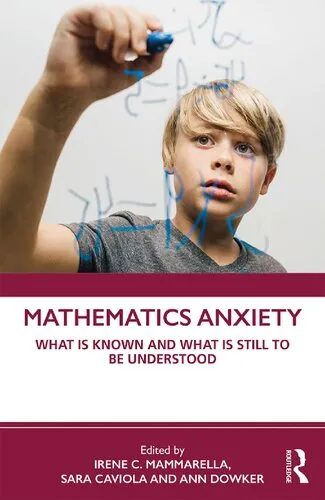




![The Mathematical Experience [Study Edn.]](https://s3.refhub.ir/images/thumb/The_Mathematical_Experience__Study_Edn_16194.webp)
